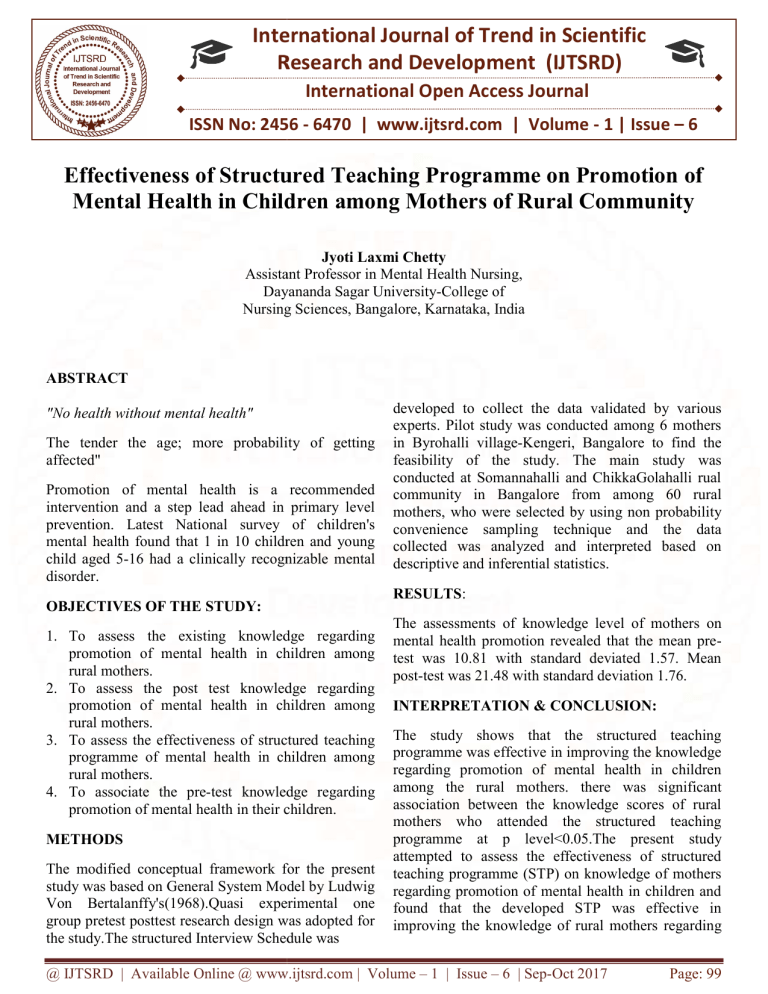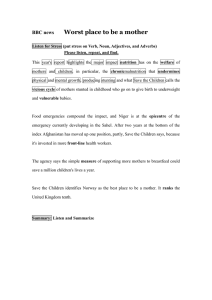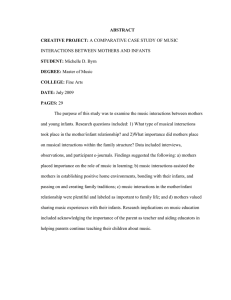
International Journal of Trend in Scientific
Research and Development (IJTSRD)
International Open Access Journal
ISSN No: 2456 - 6470 | www.ijtsrd.com | Volume - 1 | Issue – 6
Effectiveness of Structured Teaching Programme on Promotion of
Mental Health in Children among Mothers of Rural Community
Jyoti Laxmi Chetty
Assistant Professor in Mental Health Nursing,
Dayananda Sagar University
University-College of
Nursing Sciences, Bangalore, Karnataka, India
ABSTRACT
"No health without mental health"
The tender the age; more probability of getting
affected"
Promotion of mental health is a recommended
intervention and a step lead ahead in primary level
prevention. Latest National survey of children's
mental health found that 1 in 10 children and young
child aged 5-16 had a clinically recognizable mental
disorder.
OBJECTIVES OF THE STUDY:
1. To assess the existing knowledge regarding
promotion of mental health in children among
rural mothers.
2. To assess the post test knowledge regarding
promotion of mental health in children among
rural mothers.
3. To assess the effectiveness of structured teaching
programme of mental health in children among
rural mothers.
4. To associate the pre-test
test knowledge regarding
promotion of mental health in their children.
METHODS
The modified
ed conceptual framework for the present
study was based on General System Model by Ludwig
Von Bertalanffy's(1968).Quasi experimental one
group pretest posttest research design was adopted for
the study.The structured Interview Schedule was
developed to collect
ollect the data validated by various
experts. Pilot study was conducted among 6 mothers
in Byrohalli village-Kengeri,
Kengeri, Bangalore to find the
feasibility of the study. The main study was
conducted at Somannahalli and ChikkaGolahalli rual
community in Bangalore
re from among 60 rural
mothers, who were selected by using non probability
convenience sampling technique and the data
collected was analyzed and interpreted based on
descriptive and inferential statistics.
RESULTS:
The assessments of knowledge level of mothers
mo
on
mental health promotion revealed that the mean prepre
test was 10.81 with standard deviated 1.57. Mean
post-test
test was 21.48 with standard deviation 1.76.
INTERPRETATION & CONCLUSION:
The study shows that the structured teaching
programme was effective in improving the knowledge
regarding promotion of mental health in children
among the rural mothers. there was significant
association between the knowledge scores of rural
mothers who attended the structured teaching
programme at p level<0.05.The present study
attempted to assess the effectiveness of structured
teaching programme (STP) on knowledge of mothers
regarding promotion of mental health in children and
found that the developed STP was effective in
improving the knowledge of rural mothers regarding
regardin
@ IJTSRD | Available Online @ www.ijtsrd.com | Volume – 1 | Issue – 6 | Sep-Oct
Oct 2017
Page: 99
International Journal of Trend in Scientific Research and Development (IJTSRD) ISSN: 2456-6470
promotion of mental health in children.
Keywords:
structured
knowledge, mental health
teaching
programme,
INTRODUCTION:
“No health without mental health”.
A good beautiful mind is the core for successful good
life. Good mental health leads to good child and this
leads to development of a good healthy and
developing nation. Child is the mirror for the Nation.
Good mental health contributes to qualities of our
lives as individuals, as community and as a society in
general. Good child is nurtured from seeds of good
nutrition, good hygiene, healthy life style and
practices in home and those seeked and grasped from
surroundings. UNICEF estimates that over 220
million children aged less than 5 years in the
developing world have significantly impaired growth.
This evidence shows, for the first time, that a common
and potentially treatable mental health problem in
mothers is one of the causes of infant failure to thrive.
We use this evidence to present a case that child
focused interventions, largely aiming to provide
supplementary nutrition, may need to be combined
with mother focused interventions that target maternal
mental health. Childhood is a period of huge
variations, they are neither small infant nor mature
adult, these raises their demand of good attention and
guidance by the parents.1About 31000 people
especially child in growing age complete the suicidal
act each year. An average of one person every 18
patients , at least 1000 suicides occur each day and
teen suicides in US is nearly 5 times as
common among boys and girls.5
now focused on the development of strategies to
reduce mental ill health and promote mental health
and promote mental health. 5
The following ‘positive steps’ for achieving and
maintaining positive mental health have been
described as the ‘five fruit and vegetables of mental
health’: During the last two decades many studies in
India shows they mental disorders prevail in18-267
/1000 with median 65.4/1000 at any given time about
31,000 people specially child in growing age
complete the suicidal act each year an average one
person every 18 patients at least1000 suicides occur
each day
keeping physically active
eating well
for doing something creative
taking a break
asking for help 1
METHOD:
A quasi-experimental one group pretest posttest
design with non –probability convenience technique
was used in 60 rural mothers with 6-12 years children
in Somannahalli and ChikkaGollahalli. Tools used for
sociodemographic data sheet, structured interview
schedule to assess revised knowledge on promotion of
mental health. Data were gathered on individually
basis after obtaining official permission from nodal
officer, DMHP analysis was done by using descriptive
and inferential statistics.
RESULTS:
In India 12,000 children ages 5 to 14 may be
hospitalized in this country every year for deliberate
self – destruction acts and 125,000 deaths and
contributes to 10-25% of hospitals and nursing home
admissions ( Indian journal of psychiatry -2001).3
WHO states that problem increases fourfold when the
population is in slums and rural area .the inability to
cope with urban life, loss of loved ones and property
and lack of education and work leads to the hell of
mental illness. Although mothers try to feed and care
for good rearing and basic needs of their children,
even this is often not possible as sometimes mothers
are also underfed and unable to develop good mental
habits as they lack the knowledge. Global attention is
@ IJTSRD | Available Online @ www.ijtsrd.com | Volume – 1 | Issue – 6 | Sep-Oct 2017
Page: 100
International Journal of Trend in Scientific Research and Development (IJTSRD) ISSN: 2456-6470
Table 1.1& 1.2 section A: Shows frequency and
percentage of rural mothers:
to 26-30 years, 13(21.6%) were below 25,
14(23.3%)belong to 31-35 years and 10 were in age
group of 36-40 with regard to children’s’ age 23
belong to 6-8 years,21 belong to 9-11 years and 26.7.5
were in the age group of 12 years. In relation to
number of children,37(61%) mothers had 2
children,15(25),mothers’ had 1 child and 8 (14%) had
3 children. In relation with religion majority
43(71.6%) were hindu,14 (23.4%) were muslin and
3(5%) were Christian.
Table 2 Section-B shows: frequency, percentage
distribution of level of knowledge and mean and
standard deviation of rural mothers regarding
promotion of mental health before STP.
Above Table shows the frequency and percentage
distribution of demographic variables of mothers.
Regarding age, majority of mothers 23(38.3%) belong
Table 2.1.3: shows frequency and percentage distribution of level of knowledge of mothers after STP
@ IJTSRD | Available Online @ www.ijtsrd.com | Volume – 1 | Issue – 6 | Sep-Oct 2017
Page: 101
International Journal of Trend in Scientific Research and Development (IJTSRD) ISSN: 2456-6470
Table 2.1.4 Shows mean and mean % for the knowledge among rural mothers regarding promotion of
mental health in children before and after STP
Table 2.1.5.Shows level of knowledge regarding promotion of mental health before and after STP
Table2.1.6 Mean and Mean % for the knowledge among rural mothers regarding promotion of mental
health in children before and after STP.
@ IJTSRD | Available Online @ www.ijtsrd.com | Volume – 1 | Issue – 6 | Sep-Oct 2017
Page: 102
International Journal of Trend in Scientific Research and Development (IJTSRD) ISSN: 2456-6470
Table 2.2.1 shows the effectiveness of STP.
The overall mean score in posttest(21.48) was higher
than pretest mean scores (10.81)and there was
enhancement in knowledge .there was significant
difference between posttest and pretest level of
knowledge scores with “t”value of 41.9 significant at
0.05 P level. This reveals that there is a significant
difference in mean pretest and posttest knowledge
scores thus H1 research hypothesis is accepted.
Table 3.1 shows association of demographic
Variables with pretest knowledge scores
@ IJTSRD | Available Online @ www.ijtsrd.com | Volume – 1 | Issue – 6 | Sep-Oct 2017
Page: 103
International Journal of Trend in Scientific Research and Development (IJTSRD) ISSN: 2456-6470
Association of the pretest knowledge score of the
subjects, with majority of selected demographic
variables, evidenced that there was statistically
significant association at the level of p<0.05. Hence
the research hypothesis stating, that there will be
significant association between the pretest knowledge
score with selected demographic variables was
accepted.
DISCUSSION:
In this study knowledge of rural mothers was assessed
regarding promotion of mental health in children
revealing; in pretest analysis all 60(100%) of the
mothers had inadequate knowledge regarding mental
health promotion. The assessment revealed that the
mean pretest was 10.81 and standard deviation was
1.57 and mean posttest was 21.48 and standard
deviation was 1.76, this shows that with the
application of teaching program, knowledge level and
understanding on promoting mental health in children
was improved in all mothers. There was a significant
REFERENCES:
1) Helen Herman, Shekhar Saxena, Rob moodie.
Promoting Mental Health, Concepts, Emerging
evidence, Practices. Mental Health Promotion
Printed In Singapore.2005:P.2-105
2) Available
from URL:23 http://www.indianjpsychiatry.org/ar
ticle.asp?issn=0019-5545:year=2008;volume=50
3) R.Sreevani. A Guide to Mental Health and
Psychiatric Nursing. Mental Health and Mental
Illness. Jaypee Publication. New Delhi.2008; P.113
4) Mary.C.Townsend. Essentials of Psychiatric and
Mental Health Nursing: F.A.Davis and Company,
Philadelphia; 1999:P.3-16.
difference between pre and posttest knowledge scores
among rural mothers and statistical significant
association was found between the knowledge scores
of rural mothers who attended the structured teaching
programme at 0.05 level of significance.
CONCLUSION:
Health education programmers, training camps at
community level needs to be practiced by all the
nursing personnel’s. Nurse practitioner should be
actively involved in organizing based training
programmes,role plays and other various activities
with primary level, secondary level and tertiary level
integrated implication so that new cases ,identified
risk factors and barriers in implementing a
programme, effectiveness of therapies can be sorted
out.
5) Gail.W.Stuart, Michele.T.Laraia. Principals and
Practices of Psychiatric Nursing. Mental Health
Promotion.Elsevier
Publication
.New
Delhi;2005:P.
6) K.Lalitha. Mental health and Psychiatric Nursing,
An Indian Perspective: Prevalence and Incidence
of Mental Health Problems and Disorders.
Bangalore.VMG Publication; 2008:P.16-20
7) Best Practice Guidelines For Mental Health
Promotion
Programs,
available
fromhttp://www.camh.net/About_CAMH/Health_
Promotion/Community_Health_Promotion/Best_P
ractice_MHYouth/theory_def_context.html
8) Mental health Promotion: A Quality Framework
available
fromhttp://ec.europa.eu/health/ph_projects/1997/c
ancer/fp_promotion_1997_frep_b4_en.pdf
@ IJTSRD | Available Online @ www.ijtsrd.com | Volume – 1 | Issue – 6 | Sep-Oct 2017
Page: 104




